| Listing 1 - 10 of 16 | << page >> |
Sort by
|
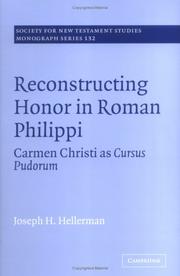
ISBN: 0521849098 0521090830 1107153212 0511182066 0511115822 0511299982 0511487975 1280431482 0511199287 051111527X 9780511115820 9780511487972 9786610431489 6610431485 9780521849098 Year: 2005 Volume: 132 Publisher: New York : Cambridge University Press,
Abstract | Keywords | Export | Availability | Bookmark
 Loading...
Loading...Choose an application
- Reference Manager
- EndNote
- RefWorks (Direct export to RefWorks)
This book examines Paul's letter to the Philippians against the social background of the colony at Philippi. After an extensive survey of Roman social values, Professor Hellerman argues that the cursus honorum, the formalized sequence of public offices that marked out the prescribed social pilgrimage for aspiring senatorial aristocrats in Rome (and which was replicated in miniature in municipalities and in voluntary associations), forms the background against which Paul has framed his picture of Jesus in the great Christ hymn in Philippians 2. In marked contrast to the values of the dominant culture, Paul portrays Jesus descending what the author describes as a cursus pudorum ('course of ignominies'). The passage has thus been intentionally framed to subvert Roman cursus ideology and, by extension, to redefine the manner in which honour and power were to be utilized among the Christians at Philippi.
Bible --- Criticism, interpretation, etc --- Bible. Philippians --- Arts and Humanities --- Religion --- Bible. --- Criticism, interpretation, etc. --- Epistle of Paul to the Philippians --- Epistle to the Philippians --- Letter of Paul to the Philippians --- Philippians --- Pillipo (Book of the New Testament)
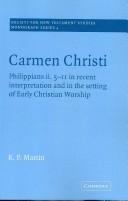
ISBN: 0511863705 0511555016 0521056853 0521018994 Year: 1967 Publisher: Cambridge : Cambridge University Press,
Abstract | Keywords | Export | Availability | Bookmark
 Loading...
Loading...Choose an application
- Reference Manager
- EndNote
- RefWorks (Direct export to RefWorks)
From the earliest times, commentators have regarded these few verses from the Epistle to the Philippians as doctrinally very important, and a whole literature has grown up around them. Dr Martin studies the passage partly for its own sake as the quintessence of Pauline thought on the person of Christ, and partly as an example of an early type of Christian literature known as 'cultic' or 'confessional'. He sees it as a carmen Christi, a Christological ode used among early believers. Its importance, as Dr Martin shows, reaches far beyond the devotional. The Church which sang this hymn proclaimed for the first time the three 'epochs' in the existence of Christ: he is hailed and confessed first as pre-existent, then as incarnate and humiliated and finally as triumphant. The hymn is thus the earliest extant statement of the basis of the whole Christology of later times.
Worship. --- Cult --- Cultus --- Religion --- Theology, Practical --- Fire-worshipers --- Bible. --- Criticism, interpretation, etc. --- Epistle of Paul to the Philippians --- Epistle to the Philippians --- Letter of Paul to the Philippians --- Philippians --- Pillipo (Book of the New Testament) --- Arts and Humanities
Book
ISBN: 9783161534119 3161534115 Year: 2015 Volume: 353 Publisher: Tübingen: Mohr Siebeck,
Abstract | Keywords | Export | Availability | Bookmark
 Loading...
Loading...Choose an application
- Reference Manager
- EndNote
- RefWorks (Direct export to RefWorks)
The articles in this collection explore the Epistle to the Philippians as an example of the relationship between Paul and his Greco-Roman environment, taking into consideration aspects of philosophy, ethics, social history, legal history, and rhetoric.
227.1*5 --- Brief van Paulus aan de Filippenzen --- Bible. --- Epistle of Paul to the Philippians --- Epistle to the Philippians --- Letter of Paul to the Philippians --- Philippians --- Pillipo (Bible of the New Testament) --- Criticism, interpretation, etc. --- Congresses. --- History --- Conferences - Meetings --- 227.1*5 Brief van Paulus aan de Filippenzen --- Pillipo (Book of the New Testament) --- Bibeln. --- 30-600.
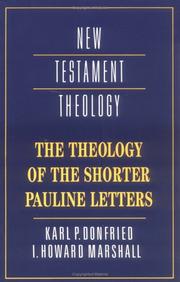
ISBN: 0521364914 052136731X 9780521367318 9780521364911 9781139166263 1139166263 Year: 1993 Publisher: Cambridge: Cambridge university press,
Abstract | Keywords | Export | Availability | Bookmark
 Loading...
Loading...Choose an application
- Reference Manager
- EndNote
- RefWorks (Direct export to RefWorks)
This book breaks new ground in offering an exposition of the theological message of the Shorter Pauline Letters. Karl P. Donfried expounds the theology of 1 and 2 Thessalonians, examining the cultural setting of these letters and the particular milieu in which their distinctive themes took shape. He shows that the notion of election is a key theme in the Thessalonian correspondence, while both letters have important things to say to people in our own day about Christ, about forgiveness, and about a sanctifying God who pours out his Spirit. I. Howard Marshall's study of Philippians brings out especially the understanding of the theological basis of the Christian life which underlies the letter, while his discussion of Philemon emphasises how the main theme of the letter is the relation between the gospel and Christian ethics; the implications of Paul's teaching on slavery are considered in a manner which goes much further than the surface of the text might imply.
Bible. --- Theology. --- 227.08 --- Paulinische theologie --- 227.08 Paulinische theologie --- Desalloniga (Book of the New Testament) --- Thessalonians (Book of the New Testament) --- Epistle of Paul to the Philippians --- Epistle to the Philippians --- Letter of Paul to the Philippians --- Philippians --- Pillipo (Book of the New Testament) --- Philemon (Book of the New Testament) --- Arts and Humanities --- Religion
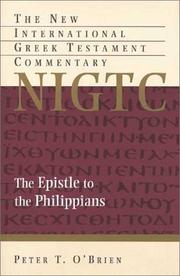
ISBN: 0802823920 9780802823922 Year: 1991 Publisher: Grand Rapids (Mich.): Eerdmans,
Abstract | Keywords | Export | Availability | Bookmark
 Loading...
Loading...Choose an application
- Reference Manager
- EndNote
- RefWorks (Direct export to RefWorks)
Bible. --- Commentaries. --- 227.1*5 --- 227.1*5 Brief van Paulus aan de Filippenzen --- Brief van Paulus aan de Filippenzen --- Epistle of Paul to the Philippians --- Epistle to the Philippians --- Letter of Paul to the Philippians --- Philippians --- Pillipo (Book of the New Testament) --- Bible
Book
ISBN: 162837098X 1628370971 1628370963 9781628370973 9781628370980 9781628370980 9781628370966 9781628370973 Year: 2015 Publisher: Atlanta : SBL Press,
Abstract | Keywords | Export | Availability | Bookmark
 Loading...
Loading...Choose an application
- Reference Manager
- EndNote
- RefWorks (Direct export to RefWorks)
Bible. --- Criticism, interpretation, etc. --- Philippi (Extinct city) --- Church history. --- Civilization. --- Epistle of Paul to the Philippians --- Epistle to the Philippians --- Letter of Paul to the Philippians --- Philippians --- Pillipo (Book of the New Testament) --- Crenides (Extinct city) --- Fílippoi (Extinct city) --- Krenides (Extinct city) --- Philippes (Extinct city) --- Philippi (City) --- Philippoi (Greece : Extinct city) --- Greece --- Antiquities
Book
ISBN: 9781108473880 1108473881 9781108462914 110846291X 1108645208 9781108645201 Year: 2020 Publisher: Cambridge : Cambridge University Press,
Abstract | Keywords | Export | Availability | Bookmark
 Loading...
Loading...Choose an application
- Reference Manager
- EndNote
- RefWorks (Direct export to RefWorks)
In this commentary, Michael Bird and Nijay Gupta situate Paul's letter to the Philippians within the context of his imprisonment as well as the Philippians' situation of suffering and persecution. Paul draws the Philippians' attention to the power and progress of the gospel in spite of difficult circumstances. He also warns them about the dangers of rival Christian groups who preach out of poor motives or have a truncated gospel. Bird and Gupta unpack the rich wisdom and theology of the Christ Hymn (2:6-11). Throughout the commentary, they apply a broad range of exegetical tools to interpret this letter including historical, sociological, rhetorical, and literary analysis, and they give attention to the reception of this important Pauline text throughout history. Bird and Gupta also includes short reflections on the meaning of Philippians for today.
Book
ISBN: 1850756384 9781850756385 Year: 1997 Volume: 136 Publisher: Sheffield: Sheffield academic press,
Abstract | Keywords | Export | Availability | Bookmark
 Loading...
Loading...Choose an application
- Reference Manager
- EndNote
- RefWorks (Direct export to RefWorks)
This large-scale work is the application of modern theories of discourse analysis to questions of Greek grammar, especially with respect to the debate over the literary integrity of Philippians. Chapter 1 introduces the linguistic theory of discourse analysis, defining key terms, sketching its historical evolution and outlining its major tenets. Chapter 2 sets forth a model of discourse analysis primarily based on the systemic functional theories of M.A.K. Halliday. Chapter 3 outlines the historical-critical debate over the literary integrity of Philippians. Chapter 4 inspects the genre of Phi.
Bible --- Discourse analysis. --- 227.1*5 --- Discourse analysis --- Discourse grammar --- Text grammar --- Semantics --- Semiotics --- Brief van Paulus aan de Filippenzen --- 227.1*5 Brief van Paulus aan de Filippenzen --- Bible. --- Epistle of Paul to the Philippians --- Epistle to the Philippians --- Letter of Paul to the Philippians --- Philippians --- Pillipo (Book of the New Testament) --- Language, style. --- Analyse du discours. --- Filippenzen (bijbelboek). --- RELIGION --- Biblical Studies --- New Testament. --- Paul's Letters. --- Paulus (Apostel). --- Critique textuelle. --- Style. --- Critique, interprétation, etc. --- exégèse. --- Criticism, interpretation, etc.

ISBN: 9780511487996 9780521804066 9780521036245 0511018363 9780511018367 0511487991 0511043902 9780511043901 052180406X 1107123569 0521036240 0511174276 1280433388 0511154038 0511328192 Year: 2001 Volume: 112 Publisher: Cambridge, UK ; New York : Cambridge University Press,
Abstract | Keywords | Export | Availability | Bookmark
 Loading...
Loading...Choose an application
- Reference Manager
- EndNote
- RefWorks (Direct export to RefWorks)
Rhetorical criticism seeks to understand and comment on the way texts function in their social and cultural contexts. Holloway puts Paul's letter in the context of ancient theories and literary practices of 'consolation' and argues that Paul wrote to the Philippians in order to console them. Holloway shows that the letter has a unified overall strategy and provides a convincing account of Paul's argument. The book falls into two parts. Part I explores the integrity of Philippians, the rhetorical situation of the letter, and ancient consolation as the possible genre of Philippians, while Part II examines Phil. 1:3-11; 1:12-2:30; 3:1-4:1 and 4:2-23. The exegetical studies in Part II focus on the consolatory topoi and arguments of Philippians.
Consolation in the Bible --- 227.1*5 --- Brief van Paulus aan de Filippenzen --- Bible. --- Epistle of Paul to the Philippians --- Epistle to the Philippians --- Letter of Paul to the Philippians --- Philippians --- Pillipo (Book of the New Testament) --- Socio-rhetorical criticism. --- 227.1*5 Brief van Paulus aan de Filippenzen --- Consolation in the Bible. --- Bible NT. Epistles of Paul. Philippians --- Bible. Philippians --- Socio-rhetorical criticism --- Arts and Humanities --- Religion
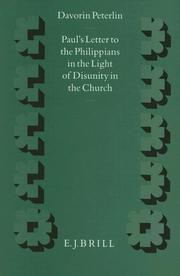
ISBN: 9004103058 9004267255 9789004267251 9789004103054 Year: 1995 Volume: 79 Publisher: Leiden ;New York E.J. Brill
Abstract | Keywords | Export | Availability | Bookmark
 Loading...
Loading...Choose an application
- Reference Manager
- EndNote
- RefWorks (Direct export to RefWorks)
This volume discusses the development of disunity in the Philippian church as the occasion for Paul's response in his letter. The first part of the book examines references and allusions to strife among the Philippians and tension between them and Paul. It demonstrates the pervasiveness of the theme of disunity in most sections of the letter. The second part correlates these findings with sections of the letter dealing with the Philippians' financial support for Paul. It treats such topics as Paul's attitude to money and the sociological composition of the church. The book's aim is to draw attention to social and non-theological aspects of the Philippian situation, and make a contribution to a more theological study of Philippians.
Church controversies --- Church disputes --- Conflicten [Kerkelijke ] --- Conflicts [Church ] --- Conflits ecclésiastiques --- Conflits religieux --- Controversen [Kerkelijke ] --- Controverses ecclésiastiques --- Controverses religieuses --- Controverses théologiques --- Controversies [Church ] --- Disputen [Kerkelijke ] --- Disputes ecclésiastiques --- Débats religieux --- Fights [Church ] --- Kerkelijke conflicten --- Kerkelijke controversen --- Kerkelijke disputen --- Luttes religieuses --- Querelles religieuses --- Bible. --- Criticism, interpretation, etc --- Critique, interprétation, etc. --- Church controversies. --- Church conflicts --- Church fights --- Conflicts, Church --- Controversies, Church --- Fights, Church --- Church management --- Religious disputations --- Criticism, interpretation, etc. --- Critique, interprétation, etc. --- Epistle of Paul to the Philippians --- Epistle to the Philippians --- Letter of Paul to the Philippians --- Philippians --- Pillipo (Book of the New Testament) --- Bible. Philippians --- Bible. - N.T. - Philippians - Criticism, interpretation, etc.
| Listing 1 - 10 of 16 | << page >> |
Sort by
|

 Search
Search Feedback
Feedback About UniCat
About UniCat  Help
Help News
News